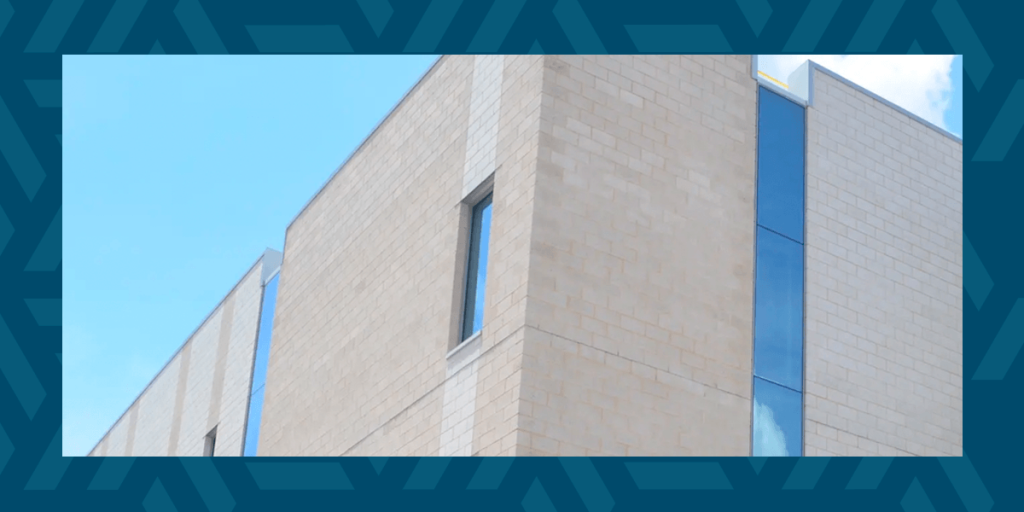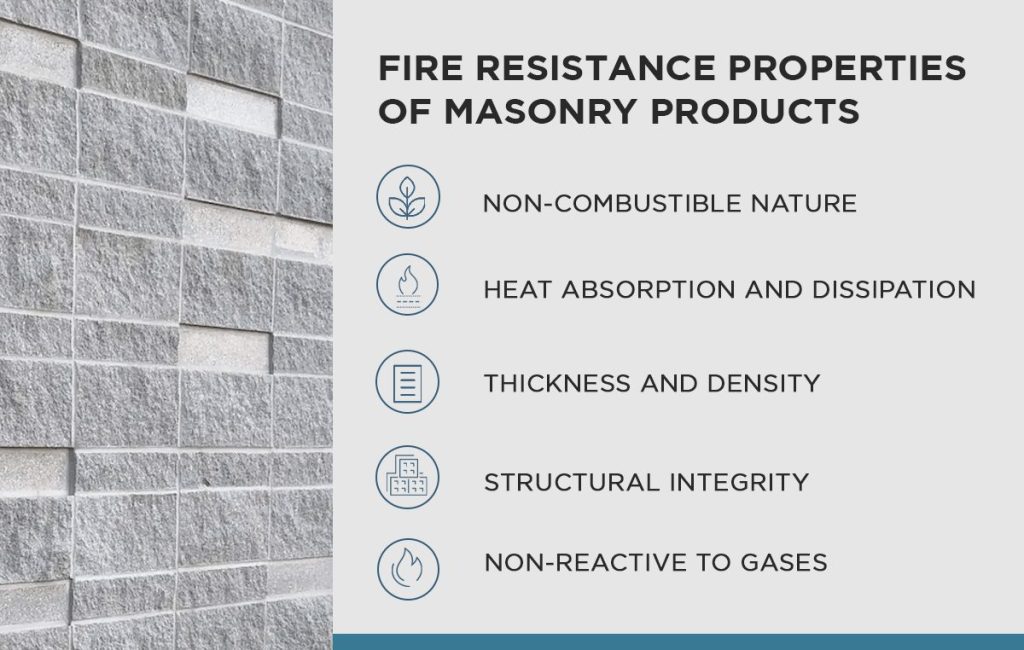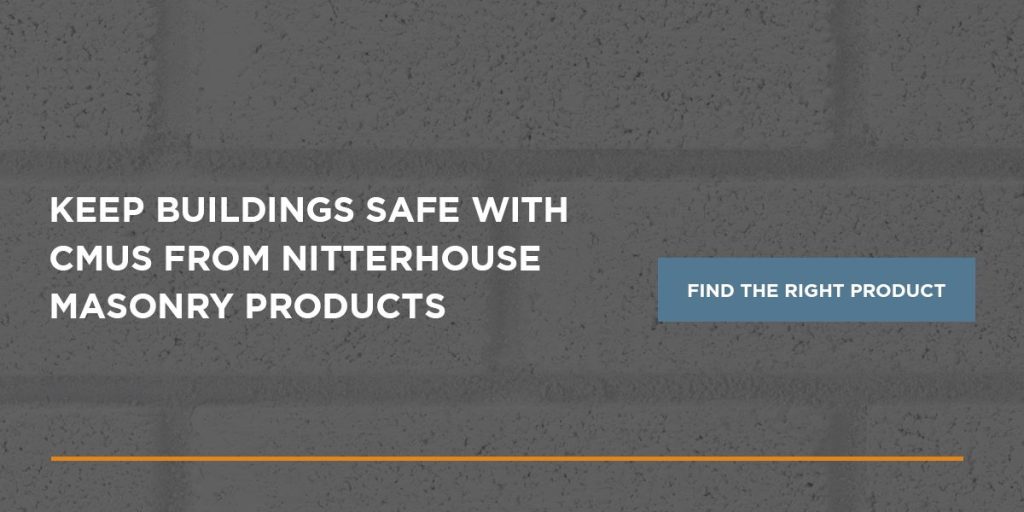
Masonry buildings and products, whether built with concrete bricks or blocks, are known for their excellent fire-resistant properties. When exposed to high temperatures, masonry products do not easily catch fire or burn. They are non-combustible, meaning they won’t ignite or spread flames easily. Rather, they act as a barrier, slowing down the progression of fire.
Overall, the fire resistance of masonry products contributes to the safety and protection of buildings and structures, giving people more time to evacuate and emergency responders more time to control any fires. Let’s take a closer look at how this fire-resistant building material works.
How Fire-Resistant Are Concrete Blocks?
Concrete blocks, especially concrete masonry units (CMUs) are often used in buildings to provide fire resistance. Even though CMUs aren’t 100% fireproof, they won’t transfer heat easily or react to other substances and gases. When installed correctly, fire pits and home fires rarely reach heat levels hot enough to damage masonry products.
Fire Resistance Ratings of Concrete Masonry Units
Fire resistance ratings refer to the measure of how well certain structures or components can withstand and resist fire. These ratings are determined through standardized tests and calculations. The purpose of these tests is to assess how long something can withstand exposure to fire without losing its structural integrity. Fire resistance ratings are expressed in terms of time, from a few minutes to a couple of hours.
The fire resistance rating of masonry blocks is crucial for ensuring the safety of buildings during a fire. A higher fire resistance rating means that the CMUs can withstand fire longer. This is an important factor for architects, builders and engineers to consider when designing and constructing buildings, ensuring compliance with fire safety regulations.
Fire Resistance Testing and Standards
The International Building Code (IBC) governs materials and assemblies used for structural fire resistance. Since full-scale fire testing normally comes with time and financial constraints, the IBC lists multiple options to test or determine fire resistance ratings, including:
- Prescriptive designs, as mentioned in Section 721 of the IBC.
- Standardized calculation procedures, as listed in Section 722 of the IBC.
- The American Society for Testing and Materials (ASTM) E119 Standard Test Methods for Fire Tests of Building Construction and Materials.
- The American National Standards Institute (ANSI)/UL 263 Standard for Safety of Fire Tests of Building Construction Materials.
Extensive testing has established a relationship between fire resistance and the solid thickness of CMUs. Solid thickness is the total volume of concrete of a hollow unit without its holes. Partially filled units are calculated as those with empty holes. However, if hollow CMUs are filled with approved materials, the equivalent thickness of the unit would be the actual thickness. Based on these calculations, the fire resistance ratings of CMUs can be measured as follows:
- 4-inch width wall: One hour for empty/partially filled and solid-filled walls.
- 6-inch width wall: One hour for empty/partially filled walls and four hours for solid-filled walls.
- 8-inch width wall: Two hours for empty/partially filled walls and four hours for solid-filled walls.
- 10-inch width wall: Two hours for empty/partially filled walls and four hours for solid-filled walls.
- 12-inch width wall: Three hours for empty/partially filled walls and four hours for solid-filled walls.
Fire resistance also differs between aggregate types used in masonry units.
Fire Resistance Properties of Masonry Products
The composition of masonry products plays a crucial role in their fire resistance. They are economical, energy efficient and minimize the risk of fire for the lowest initial cost compared to other building materials while requiring the least amount of maintenance. Additionally, most concrete structures don’t require additional fire protection applications.

Masonry products generally include the following fire-resistant properties:
- Non-combustible nature: Masonry products do not easily catch fire or contribute to spreading flames, which helps to prevent flames from spreading in an area.
- Heat absorption and dissipation: Temperatures can reach 2,000 degrees Fahrenheit in a few minutes during a fire. With a high thermal mass, masonry products absorb and dissipate heat effectively. This slows down the progression of fire and reduces the transfer of heat to unexposed areas.
- Thickness and density: Thicker units provide a physical barrier against heat transfer. The thicker the masonry walls, the longer they can contain and resist the effects of a fire.
- Structural integrity: Masonry products possess fire resilience, which is the capacity to maintain their function after a fire without developing any deformations or risking structural collapse.
- Non-reactive to gases: Masonry products do not emit carbon dioxide or other gases that are considered a health and safety risk to people or the environment when affected by a fire.
Benefits and Applications of Fire-Resistant Masonry Products
Regardless of the structure type, the type of materials chosen for a building will play a significant role in safety. Masonry structures are made to resist heat and flames better than conventional buildings.
These are the benefits of using fire-resistant masonry products:
- Enhanced safety and protection: The role concrete masonry blocks play in slowing down heat and flames gives extra critical time in saving lives and mitigating property damages. This is especially important in residential units where multiple kitchens, furnaces and other sources of heat increase the risk of fire hazards.
- Compliance with building codes and regulations: Depending on the type of building, fire resistance ratings of walls need to be at least two hours. Masonry walls can easily provide between two and four hours or more.
- Insurance and cost savings: Since CMUs are weather-resistant and provide more protection from fires and break-ins than other building materials, homeowners and property investors can save on insurance costs. Most CMUs that have been exposed to fire only require some cleaning and minor repairs.
It’s due to these benefits that fire-resistant masonry products have various applications. For example:
- Residential construction: Fire-resistant masonry products provide added protection in residential buildings, whether they are single-family homes or apartment complexes.
- Commercial buildings: You can reduce the risk of fire-related injuries and property damage by using CMUs in commercial buildings, from offices and hotels to hospitals and shopping centers.
- Industrial facilities: Manufacturing and storage facilities need robust fire protection measures and using fire-resistant CMUs to construct walls, partitions and enclosures can help protect employees and valuable assets.
Keep Buildings Safe With CMUs From Nitterhouse Masonry Products
We provide high-quality concrete masonry products that are visually appealing but still preserve the strength and integrity of your structures. The fire resistance of masonry products in landscaping and construction provides multiple benefits and applications to using these materials, especially when it comes to health and safety, building compliance and cost savings.
Let our team at Nitterhouse Masonry Products help you find the right product for your next project or locate a dealer in your area today.



